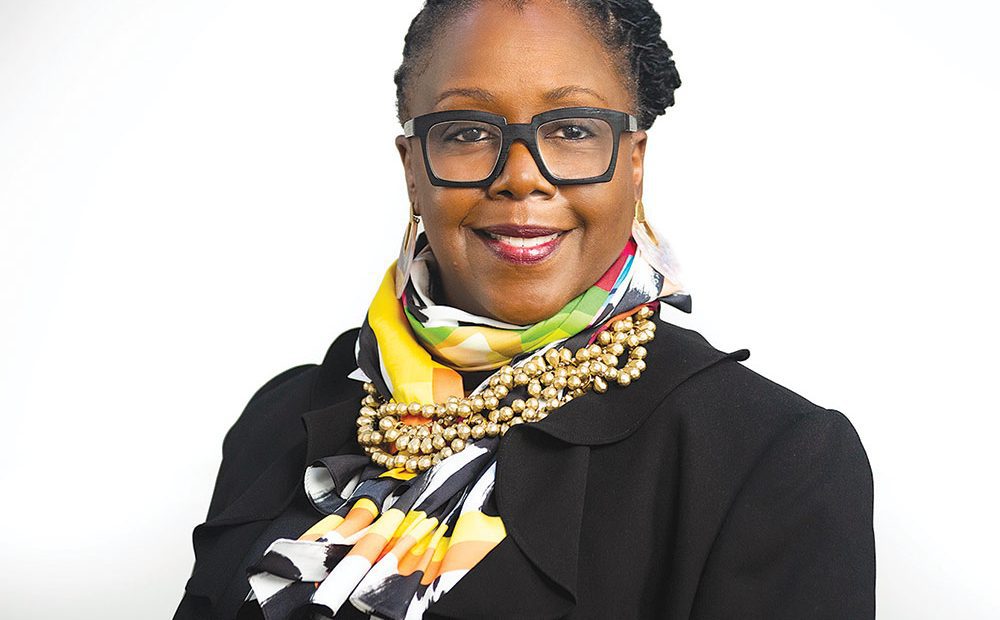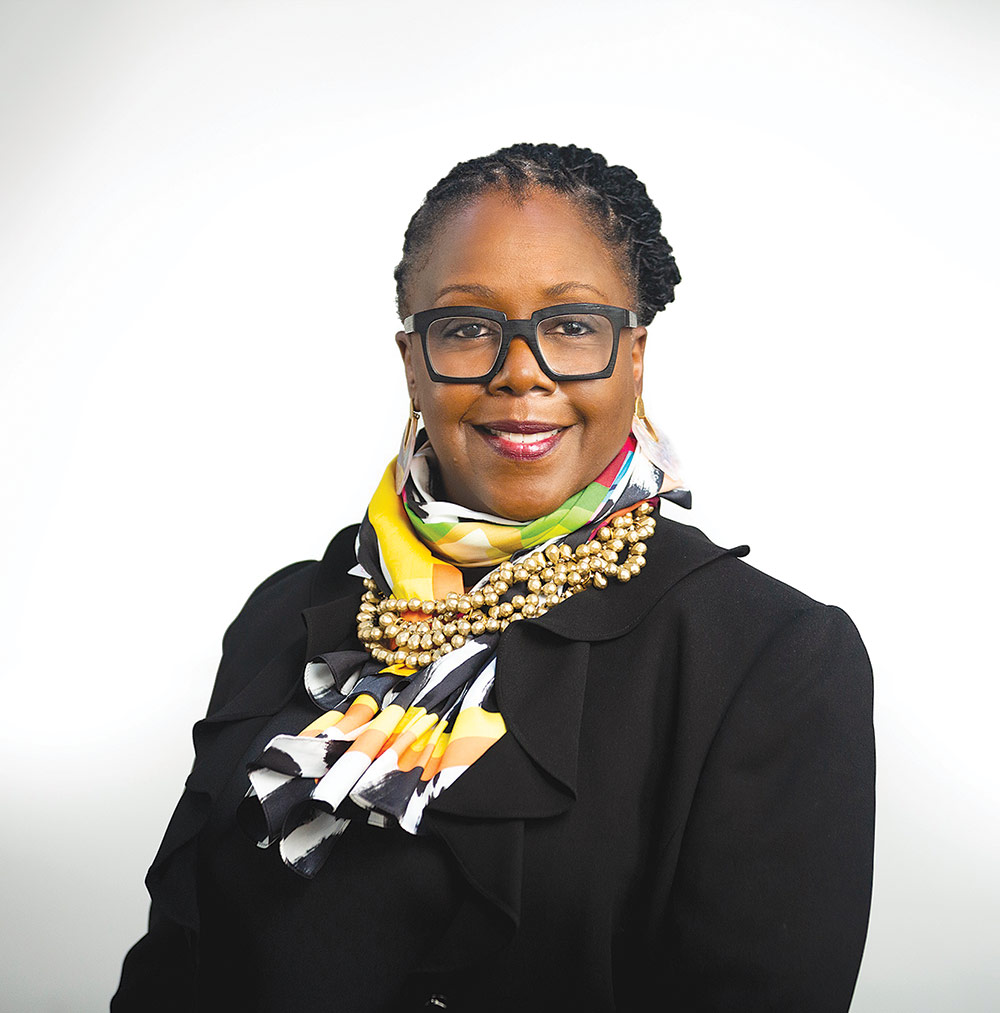
Zelda Harris Chosen to Lead WNE School of Law
Courting an Opportunity

Zelda Harris sees WNE Law as a natural progression in her career and mission.
Zelda Harris says she was already aware that Western New England University (WNE) was looking for a dean for its law school — a search firm had reached out to her.
But when a former student and mentee, who is working as associate dean of Law Student Affairs at WNE School of Law and was on the search committee to find the next dean, reminded her that the job was open and that she should look into the position, she took even more interest.
And her interest was already piqued because she already knew quite a bit about WNE and its law school — and saw the dean’s position as a unique opportunity, one that would eventually prompt her to leave the Windy City and the Loyola University Chicago School of Law, where she has taken on a number of positions, including interim dean, a post she held for a year until July 2022, and her current role as director of the Dan K. Webb Center for Advocacy.
Specifically, it’s an opportunity to work for a school that has “a great mission” that aligns with her work, specifically in the broad and important realm of experiential learning.
“Most of my experience, as a litigator, a practitioner, and an educator, have been in that space, making sure that students are prepared for practice by ensuring that they have quality experiential courses within the law school,” she explained.
Elaborating, she said that, while at the University of Arizona’s James E. Rogers College of Law, she “ran a law firm within the law school,” one that was dedicated largely to domestic violence but that also took on a number of other issues ranging from child-welfare matters to immigration to criminal defense.
“Western New England has a laser focus on experiential learning opportunities that are carried out through the clinics that are internal to the law, but also the amount of community engagement.”
“That’s experience that employers don’t necessarily want to pay the students for on the job,” she explained. “So if you can get them trained up on how to litigate or understand the professional dynamics of practice … that is what a modern law school not only should strive to do, but is required to do under our accreditation standards.”
Some schools do it better than others, and Western New England has developed a strong reputation in that realm, especially through the creation in 2019 of the WNE School of Law Center for Social Justice, which, through pro bono initiatives, assists marginalized, underserved, BIPOC, low-income, women, LGBTQ+, and immigrant communities.
Harris said she intends to continue and build upon a strong track record of excellence when it comes to the center’s efforts to strengthen collaborative efforts between the law school and the local region to work toward a more just, equitable, and inclusive society.
Harris, who is slated to start at WNE later this summer, although she is onboarding now and meeting with the law school’s leadership team on a weekly basis, takes the helm at a time when enrollment at law schools nationwide is at a crossroads of sorts.
There was a period of decline roughly a decade ago, but then a bump that coincided with the pandemic and the wave of social unrest that swept the country, she said, noting that many “felt that going to law school was a way to address issues of systemic inequity that was brought to the forefront.”
By most accounts, that bump is over, she said, adding that there are question marks concerning where the numbers will go in the months and years to come.
Meanwhile, there is evidence of growing need among those in many different sectors for the skills that law-school education can provide, she said, adding that there are master’s degree programs at many law schools that meet that need and have become increasingly popular, and she would like to bring them to WNE (more on that later).
For this issue and its focus on education, BusinessWest talked at length with Harris about this opportunity she’s seized and how she intends to build on the already-solid foundation at WNE Law.
Case in Point
Harris, a graduate of Washington University School of Law in St. Louis who began her practice as an attorney at the Land of Lincoln Legal Assistance Foundation in Alton, Ill., brings more than 30 years in law-school education and administration to her new role at Western New England.
She started at the Northwestern University Law School in 1992, where she was a senior lecturer, staff attorney, and adjunct faculty member. Later, at the University of Arizona and its James E. Rogers School of Law, she served as a clinical professor of Law and director of the Domestic Violence Law Clinic, a multi-disciplinary clinical program. She also co-directed the Child and Family Law Clinic.
“The number of people who are interested in law school, nationwide, are down in comparison to those pandemic years. But if you compare them to 2019, they’re level, and we’re even a few points ahead when it comes to interest at Western New England.”
At Loyola University Chicago School of Law, she has held numerous positions, but is perhaps most noted for her work overseeing all aspects of the Center for Advocacy, including work in collaboration with others to develop programs and curriculum in the areas of trial and appellate advocacy and alternative dispute resolution, while also overseeing curriculum development in both the JD certificate and LLM programs in advocacy.
She served as associate dean of Academic Affairs from 2018 to 2021 and, as noted earlier, served for a year as interim dean, overseeing all aspects of operation for the law school, which at the time had more than 1,200 students (undergraduate and graduate); 150 full-time faculty, staff, and administrators; and a $54 million operating budget.
The position at WNE represents an opportunity to come home, in some respects, said Harris, noting that both she and her husband are from Massachusetts (Newton and Cambridge, respectively) and were married in Williamstown. Beyond that, it’s an opportunity to take her career, and her ongoing work in experiential learning, in an intriguing new direction.
“Western New England has a laser focus on experiential learning opportunities that are carried out through the clinics that are internal to the law, but also the amount of community engagement — sending the law students out into the legal community, mostly in Springfield, to practice under the supervision of other practicing attorneys — and there’s an academic component as well, so the students are receiving academic credits.
“But they’re also providing a key service to the community because, as in all communities, there’s high demand and unmet legal needs among people who are unable to afford legal representation in the private market,” she went on, adding that it will be her goal and mission to continue and build on these initiatives.
Returning to the subject of enrollment, Harris said things have certainly “settled” since the sharp declines witnessed a decade or so ago, a phenomenon that, coupled with the retirement of many Baby Boomer lawyers, created severe challenges for firms looking to hire, challenges that persist today on many levels.
There was that surge that accompanied the pandemic, she noted, but recent data shows numbers returning to where they were in those years before COVID arrived.
“The number of people who are interested in law school, nationwide, are down in comparison to those pandemic years,” she noted. “But if you compare them to 2019, they’re level, and we’re even a few points ahead when it comes to interest at Western New England.”
As for who is going to law school these days, she said most are coming right from an undergraduate institution, although some are finding their way there after a few — or, in some cases, more than a few — years of work in various fields.
That’s the case at Western New England, she said, which has a robust part-time program that is attractive to working professionals that tend to be somewhat older than the mean for incoming law-school students — the mid-20s.
Meanwhile, there is, as noted earlier, growing interest in the skillsets provided by a law-school education, she said, adding that such training, through those master’s degree programs, is contributing to the professional development of those in many fields, while also opening doors career-wise.
“Take, for example, someone in the healthcare insurance industry — a field that’s adjacent to the law, if you will, but that person wouldn’t need a full law degree,” Harris noted. “Another example would be a social worker, such as those involved in the criminal-justice system; they don’t need to be a lawyer, but they do need to have legal knowledge in order to move up the ladder in their career or just be better practitioners for their clients.
“Those types of master’s degrees are not currently part of the programs at Western New England, but it’s something that I would like to explore,” she went on. “We’ve had great success with them here at Loyola; in fact, we offer them in an online format to make them more accessible to the working professional.”
Bottom Line
Creating such programs will require planning and resources, Harris said, adding that this will be one of many priorities she will address upon arriving later this summer.
Overall, she intends to do a needs assessment for the region, determine how the region’s only law school might address those needs, and then create a new business plan moving forward.
Her broad intention is to build on an already impressive record of success and set the bar — that’s an industry term — even higher.




